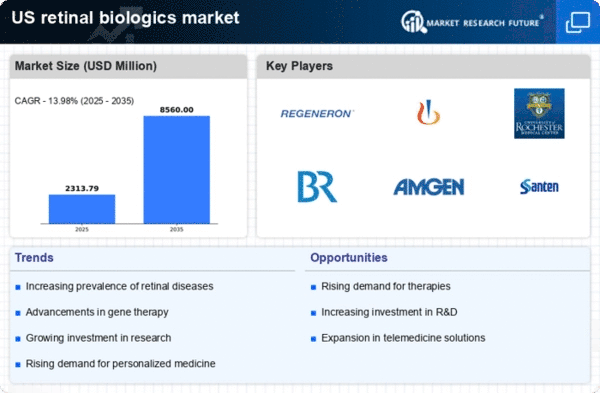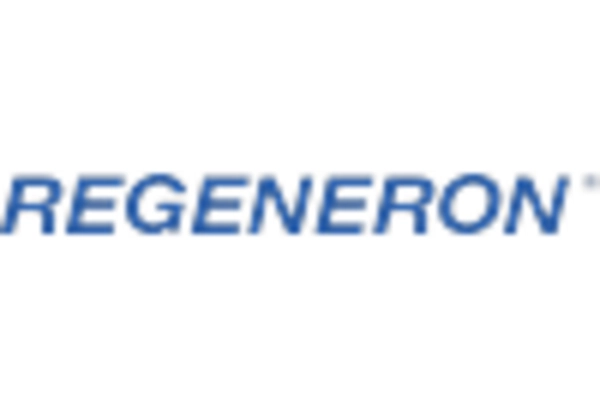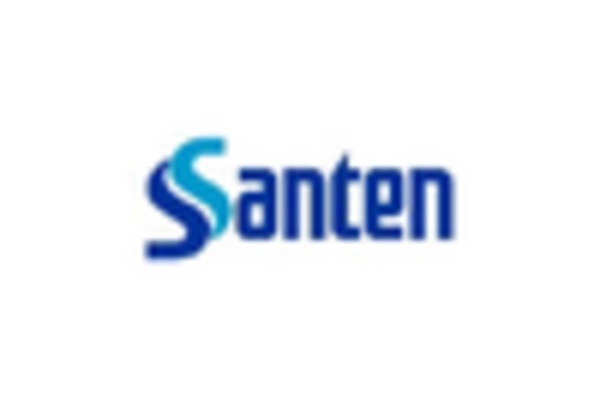Advancements in Biologic Therapies
Technological advancements in biologic therapies are significantly influencing the retinal biologics market. Innovations in drug delivery systems, such as sustained-release formulations and gene therapies, are enhancing the efficacy and safety profiles of treatments. For instance, recent developments in anti-VEGF therapies have shown promising results in managing retinal diseases, leading to improved patient outcomes. The retinal biologics market is likely to benefit from these advancements, as they provide new avenues for treatment that were previously unavailable. Additionally, the integration of personalized medicine approaches is expected to further refine treatment strategies, tailoring therapies to individual patient needs. This evolution in biologic therapies not only enhances therapeutic options but also drives market growth by attracting investment and fostering research initiatives aimed at developing next-generation treatments.
Rising Prevalence of Retinal Diseases
The increasing incidence of retinal diseases, such as age-related macular degeneration (AMD) and diabetic retinopathy, is a primary driver for the retinal biologics market. According to recent estimates, AMD affects approximately 2.1 million individuals in the US, with projections indicating that this number could rise significantly in the coming years. This growing patient population necessitates innovative treatment options, thereby propelling the demand for biologics. The retinal biologics market is expected to witness substantial growth as healthcare providers seek effective therapies to manage these conditions. Furthermore, the aging population in the US is likely to exacerbate the prevalence of these diseases, creating a pressing need for advanced biologic solutions. As a result, the market is poised for expansion, driven by the urgent requirement for effective interventions in retinal health.
Growing Awareness and Education Initiatives
The retinal biologics market is experiencing growth due in part to increased awareness and education initiatives aimed at both healthcare professionals and patients. Campaigns focused on the importance of early detection and treatment of retinal diseases are gaining traction, leading to higher rates of diagnosis and treatment. For instance, organizations dedicated to eye health are actively promoting screening programs, which may result in a greater number of patients seeking biologic therapies. This heightened awareness is likely to drive demand for innovative treatments, as patients become more informed about their options. Additionally, healthcare providers are receiving enhanced training on the latest biologic therapies, further facilitating their adoption in clinical practice. Consequently, the retinal biologics market is poised for growth as awareness initiatives translate into increased patient engagement and treatment uptake.
Regulatory Support for Innovative Therapies
Regulatory support for innovative therapies is a crucial driver of the retinal biologics market. The US Food and Drug Administration (FDA) has implemented expedited pathways for the approval of biologic therapies, facilitating faster access to new treatments for patients. This regulatory environment encourages pharmaceutical companies to invest in the development of novel biologics, as the approval process becomes more streamlined. In recent years, several biologics have received breakthrough therapy designations, underscoring the FDA's commitment to advancing treatment options for retinal diseases. This supportive regulatory framework is likely to enhance the attractiveness of the retinal biologics market, as companies are incentivized to bring innovative therapies to market. As a result, the market is expected to grow, driven by the influx of new biologic products that address unmet medical needs in retinal health.
Increased Investment in Research and Development
Investment in research and development (R&D) within the retinal biologics market is on the rise, driven by the need for innovative therapies. Pharmaceutical companies and biotech firms are allocating substantial resources to explore novel biologic agents and treatment modalities. In 2025, R&D spending in the ophthalmic sector is projected to reach approximately $5 billion in the US, reflecting a commitment to advancing retinal health. This influx of funding is likely to accelerate the development of new biologics, enhancing the treatment landscape for retinal diseases. Furthermore, collaborations between academic institutions and industry players are fostering a conducive environment for innovation, potentially leading to breakthroughs in biologic therapies. As a result, the retinal biologics market is expected to expand, supported by a robust pipeline of new products and therapeutic options.
















